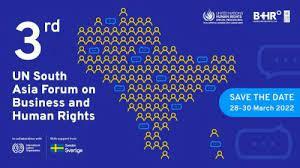
https://www.ohchr.org/en/events/forums/2022/2022-un-south-asia-forum-bus...
https://bizhumanrights.asia-pacific.undp.org/content/bizhumanrights/en/h...
The inaugural session featured remarks from Principal Secretary to the Prime Minister Ahmad Kaikaus and Swedish Ambassador Alexandra Berg von Linde, who noted the encouraging progress across the region in implementing the UN Guiding Principles on Business and Human Rights (UNGPs) and the development of national action plans (NAPs) on business and human rights (BHR).
“Human rights are everyone’s business,” said Berg von Linde, emphasizing the importance of ensuring women and marginalized stakeholders are included in these processes.
Reflecting on the role the UN South Asia Forum has played in accelerating momentum across South Asia to develop NAPs and improving business respect for human rights in the region, Surya Deva, Member of the UN Working Group on Business and Human Rights, noted that “these events trigger change” as a platform for networking and peer learning.
Following the first forum in 2019, the Indian government launched the National Guidelines for Responsible Business Conduct in line with the UNGPs. The forum also triggered the Government of Pakistan to start developing a NAP, and in September 2021 it became the first South Asian nation to adopt a NAP on business and human rights. The Government of Nepal is also in advanced stages of developing a NAP.

Further strides were made at the 2022 forum. During the opening high-level plenary, Ahmed Adham Abdulla, Vice Chair of the Maldives National Human Rights Commission, announced the country’s commitment to develop a NAP through a consultative process over the next four years. And the forum’s closing offered positive signs for the BHR agenda in Bangladesh, with the chair of the National Human Rights Commission inviting the chair of the Bangladesh Investment Development Authority to join hands in driving the process of developing a NAP.
With speakers representing governments, businesses, and civil society organizations from Bangladesh, India, the Maldives. Nepal, Pakistan, Sri Lanka and around the globe, the forum helped foster joint action and regional learning to prevent, mitigate and remediate business-related human rights abuses. It also provided impetus for actors in the region to drive change through standards and processes that work for South Asia.
The forum – organized by the UN Working Group on Business and Human Rights (UNWG), UNDP, and the International Labour Organization (ILO), with support from the Government of Sweden – featured two days of public plenary sessions that covered the informal economy, access to remedy, human rights due diligence, occupational safety and health, climate action, trade and investment, and ways to build momentum for bottom-up action.
In addition, it hosted safe spaces for closed door discussions among civil society organizations and human rights defenders, trade unions, national human rights institutions, and businesses. Country-focused sessions were held for Bangladesh, India, Nepal, Pakistan and Sri Lanka, where discussions looked at the state of business and human rights in those countries.
During the week prior to the main forum, forum organizers partnered with leading organizations in the region to host side sessions on topics ranging from the reintegration of migrant workers, the construction sector in Bangladesh, and addressing human rights abuses in global supply chains, to amplifying indigenous voices and respecting children’s rights in the digital era, among others.
Watch all the UN South Asia Forum sessions here.










Add new comment